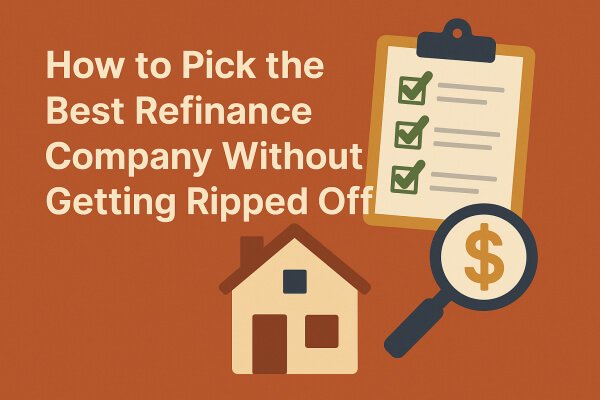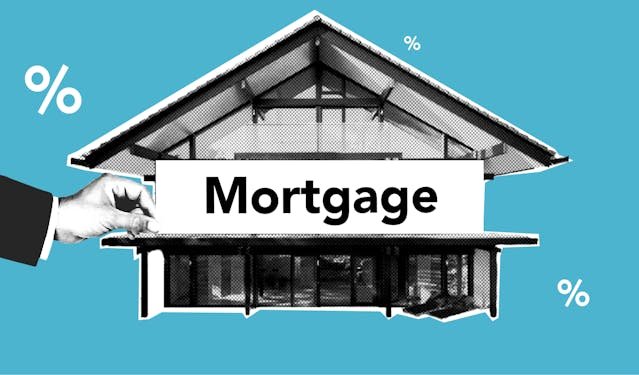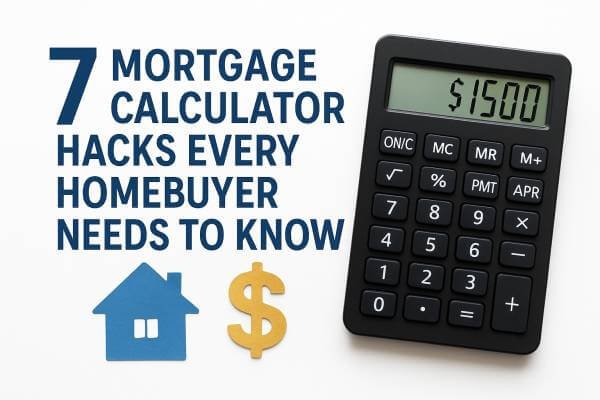How to Pick the Best Refinance Company Without Getting Ripped Off

Finding the best refinance company matters a lot, especially if you want to avoid getting ripped off. Refinancing your mortgage can be a smart move if you do it right. But with so many lenders out there, it’s easy to get overwhelmed or, worse, taken advantage of.
In reality, not all lenders prioritise your best interests. That’s why finding the best refinance company matters more than ever. You want someone who’s upfront, fair, and actually helps you save money, not bury you in fine print and surprise fees.
In this guide, I’ll walk you through how to spot the good ones, dodge the bad deals, and confidently choose a refinance company that works for you.
Know Your Refinance Goals First
Before you start comparing lenders or filling out applications, it’s important to get clear on why you want to refinance in the first place. Your reason will shape what kind of lender you should be looking for and help you spot the best refinance company for your specific needs.
Some people refinance to score a lower monthly payment. Others want to shorten their loan term and pay off their mortgage faster. Additionally, some individuals seek a cash-out refinance to access equity from their home for purposes such as renovations or debt consolidation.
Each goal has its set of priorities. For example, if you’re focused on getting the lowest rate possible, you’ll want to shop around more aggressively and ask about rate locks. If speed is your top concern, a tech-savvy lender with quick turnaround times might be the better fit.
Knowing your refinance goal puts you in control and makes it easier to identify a company that can truly meet your needs.
Warning Signs of a Bad Refinance Deal
Even if a lender looks legit on the surface, there are subtle (and not-so-subtle) red flags that could mean trouble. Here’s how to spot a refinance deal that’s more scam than savings before it’s too late.
1. Teaser Rates That Disappear Quickly
Some lenders hook you with incredibly low interest rates, only to switch them later in the process. These teaser rates often don’t include fees or are only valid for buyers with perfect credit. The best refinance company will be transparent about the actual costs, avoiding any misleading tactics.
2. Vague or Hidden Fees in the Fine Print
Watch for lenders who avoid giving you a clear breakdown of costs. Hidden fees like administrative charges, processing fees, or inflated third-party costs can add thousands to your loan. Always ask for a full loan estimate and read every line.
3. High-Pressure Sales Tactics
If a lender is pushing you to “lock in now” or says their deal will “expire today,” hit pause. These tactics are designed to rush your decision before you have time to compare options. The best refinance company will give you space to think and decide.
4. Poor Communication or Unanswered Questions
If a lender is slow to reply, dodges your questions, or can’t explain their terms in plain English, consider it a warning sign. Clear communication is key during the refinance process. You deserve straight answers, not confusion.
5. Too-Good-to-Be-True “No Closing Cost” Offers
Some “no closing cost” deals simply roll those costs into your loan balance, meaning you’ll pay more over time with interest. A reputable lender will break this down for you so you understand what you’re actually paying.
6. Negative Reviews or Complaints
Always check reviews and complaints before moving forward. Google reviews, Trustpilot, the Better Business Bureau (BBB), and the Consumer Financial Protection Bureau (CFPB) are excellent places to start. Patterns of complaints are a major red flag.
Key Features of the Best Refinance Company
When searching for the best refinance company, there are a few must-haves you should never compromise on. These features will help you avoid shady lenders and get a deal that actually works in your favour.
1. Transparent Fees With No Surprises
A trustworthy refinance company breaks down every cost, like interest rate, origination fees, points, and closing costs, before you commit. You shouldn’t have to dig through fine print to understand what you’re paying for.
2. Competitive and Honest Interest Rates
The best refinance companies offer rates that reflect current market trends. More importantly, they’ll explain why your rate is what it is based on your credit, loan term, and equity. No bait-and-switch tactics.
3. Excellent Customer Service That Actually Cares
Customer support matters. Look for lenders that respond quickly, answer your questions clearly, and guide you through the process. If they’re ghosting you during the quote stage, that’s a bad sign.
4. Strong Reputation and Reviews
Always do your homework. Check reviews on Google, Trustpilot, and the Better Business Bureau. You can even search for complaints on the Consumer Financial Protection Bureau (CFPB) site. A strong reputation is highly significant.
5. Easy-to-Use Digital Tools
A top refinance company will make your life easier with online applications, e-signatures, mortgage calculators, and secure document uploads. If their process appears cumbersome or antiquated, it should raise concerns.
6. Personalized Loan Guidance
Every borrower is different. The best companies take time to understand your financial goals and match you with the right product.
How to Research and Compare Lenders Like a Pro
Finding the best refinance company isn’t about picking the first lender you see in an ad. It’s about doing a little digging and knowing exactly what to look for. Here’s a guide on how to compare your options as if you were a seasoned homeowner.
Start With Trusted Sources
Use reputable comparison sites like
- LendingTree
- Bankrate
- NerdWallet
These platforms let you compare interest rates, terms, and reviews all in one place. Just be sure to double-check everything directly with the lender before making a decision.
Request Multiple Loan Estimates
Don’t settle for just one quote. Ask for loan estimates from at least three different companies. The following information allows you to compare:
- Interest rates
- APR (Annual Percentage Rate)
- Estimated monthly payments
- Closing costs
Small differences in these numbers can add up to big savings.
Pay Attention to the APR
The APR includes both your interest rate and any fees, so it gives you a more accurate view of the total cost. The best refinance company will give you a fair APR and explain how it’s calculated.
Compare the Total Cost, Not Just the Rate
A lender might offer a slightly lower rate but charge thousands more in fees. Always compare the full picture, including:
- Upfront fees
- Points
- Prepayment penalties (if any)
Use a side-by-side chart or spreadsheet to stay organized.
Check the Lender’s Reputation
A quick Google search can save you from many headaches. Look for recent customer reviews and pay attention to recurring complaints. Check if the company has any regulatory actions or unresolved issues with the Better Business Bureau or CFPB.
Questions to Ask Before You Commit
Once you’ve narrowed down your options, it’s time to dig a little deeper. Asking the right questions can help you avoid bad deals and zero in on the best refinance company for your situation.
1. What’s the Total Cost of the Loan Over Time?
Don’t just focus on the monthly payment; look at the full cost of the loan over its lifetime. A slightly lower rate might still cost more if it comes with high fees or a longer term.
2. Are There Any Prepayment Penalties?
Some lenders charge you for paying off your mortgage early. If you decide to sell your home or refinance again, you will incur additional costs. Make sure you ask about this upfront.
3. Is This a Fixed or Adjustable Rate?
A fixed-rate loan keeps your payment the same every month. An adjustable-rate mortgage (ARM) might start low, but it can increase later. The best refinance company will help you weigh the pros and cons based on your financial goals.
4. Can I Lock in This Rate?
Rates can change daily, sometimes even hourly. A rate lock guarantees your interest rate while your loan is being processed. Ask how long the lock lasts and whether it costs anything.
5. What Are the Closing Costs, and Can They Be Rolled Into the Loan?
Typical closing costs range from 2% to 5% of your loan amount. You’ll want a full breakdown of these fees. Some lenders let you roll them into the loan, but that means you’ll pay interest on them too.
6. How Long Will the Refinance Process Take?
Timing matters, especially if you’re refinancing to meet a financial goal like lowering your monthly payment before your next big expense. Ask for a realistic timeline from application to closing.
Top-Rated Refinance Companies in 2025
If you’re still wondering how to choose the best refinance company, here’s a helpful shortcut. We’ve rounded up some of the highest-rated mortgage refinance lenders in 2025, based on interest rates, customer satisfaction, digital tools, and transparency.
Each company listed below has a proven track record and unique strengths. Whether you value low fees, rapid processing, or hands-on service, there’s something here for every type of homeowner.
1. Rocket Mortgage
Best for: Fast, fully digital refinance experience
Rocket Mortgage (by Quicken Loans) continues to lead the market thanks to its ultra-smooth online platform. You can apply, upload documents, and track your loan progress without ever picking up the phone. Their mortgage calculator and rate estimator make it easy to compare your options before committing.
Why it’s a top pick:
- Streamlined application process
- Helpful online tools
- Fast turnaround times
Watch out for: Slightly higher fees compared to some credit unions or smaller lenders
2. Better Mortgage
Best for: Borrowers who want zero lender fees
Better stands out for being upfront about costs. They charge no lender fees, no application fee, no origination fee, and no commission-based upselling. The entire process is online and efficient, making it ideal for borrowers who want to save time and money.
Why it’s a top pick:
- No lender fees
- Transparent pricing
- Competitive rates
Watch out for: Limited availability in some states
3. Chase Bank
Best for: Existing Chase customers and those who want in-person help
Chase combines big-bank reliability with strong refinance programs, especially for those who already bank with them. If you prefer to meet with someone face-to-face or have complex financial needs, Chase offers both online tools and brick-and-mortar support.
Why it’s a top pick:
- Relationship discounts for current customers
- Trusted name and strong reputation
- Access to in-person mortgage advisors
Watch out for: Slower processing compared to digital-first lenders
4. LoanDepot
Best for: Homeowners who may refinance more than once
LoanDepot offers a hybrid experience: you can apply online or work with a loan officer. What makes them unique is their lifetime guarantee; refinance with them again, and they’ll waive lender fees and reimburse appraisal costs. Perfect if you plan to refinance again in the future.
Why it’s a top pick:
- Flexible refinance options
- Lifetime Guarantee for future refinance
- Strong customer service ratings
Watch out for: loan officers, who may vary in responsiveness depending on location
5. Credible (Marketplace)
Best for: Quick comparison shopping across multiple lenders
Credible isn’t a lender itself; it’s a marketplace that pulls personalized quotes from vetted refinance companies. You fill out one form, and Credible shows you offers from various lenders, helping you easily compare rates, terms, and fees without hurting your credit.
Why it’s a top pick:
- One application, multiple quotes
- No hard credit pull to see rates
- Great for first-time refinancers
Watch out for: Some lenders on the platform may follow up with direct offers
How to Protect Yourself and Still Get a Great Deal
Refinancing can be a smart financial move, but only if you choose the best refinance company for your needs. With the right lender, you can lower your monthly payments, reduce your loan term, or even tap into your home equity without getting buried in fees or fine print.
Here are some tips to ensure a successful refinance journey:
Take Your Time and Don’t Rush the Process
It’s tempting to jump at the first low rate you see, but slow down. Get multiple quotes, read every document, and ask every question, even the “obvious” ones. The more informed you are, the harder it is for a shady lender to take advantage of you.
Trust the Numbers, Not the Sales Pitch
Ignore flashy marketing and focus on the facts. Compare APRs, total loan costs, and terms side-by-side. The lender that helps you save the most in the long run, not just this month, is the one worth going with.
Listen to Your Gut
If something feels off, if the lender is dodging questions, rushing you, or making promises that sound too good to be true, it probably is. The best refinance company will earn your trust, not pressure you into a decision.
Document Everything
Keep written records of every conversation, email, estimate, and agreement. That way, if something goes sideways, you have proof of what was promised.
Don’t Be Afraid to Walk Away
Just because you start an application doesn’t mean you have to finish it. If you find a better deal or something doesn’t sit right, move on. Your mortgage is too important to settle.
Frequently Asked Questions (FAQs)
- What is the best refinance company for homeowners with bad credit?
If your credit score isn’t great, look for lenders that specialize in working with low-credit borrowers. Some solid options include New American Funding, Carrington Mortgage Services, and FHA-approved lenders. They often offer more flexible requirements but may charge slightly higher interest rates.
- How do I know if a refinance offer is legit?
A legitimate refinance offer includes a loan estimate that clearly outlines your rate, fees, terms, and monthly payment. Never feel pressured to act quickly, and ensure there are no upfront application fees. Always check the lender’s reviews, BBB rating, and any complaints filed with the Consumer Financial Protection Bureau (CFPB).
- What is a no-closing-cost refinance, and is it a beneficial idea?
A no-closing-cost refinance means the lender covers your fees, but usually by rolling them into the loan balance or charging a slightly higher interest rate. It’s convenient short-term but could cost more over the life of the loan. The best refinance company will walk you through the pros and cons before you decide.
- How many times can I refinance my mortgage?
Technically, you can refinance as often as it makes financial sense. There’s no legal limit, but lenders usually require a “seasoning period” (typically 6–12 months between refinances). Just make sure the savings outweigh the costs each time you refi.
- Does refinancing hurt my credit score?
A refinance involves a hard credit inquiry, which may cause a small, temporary dip in your score. However, the impact is usually minor, especially if you apply with multiple lenders within a 30-day window, which counts as a single inquiry under most scoring models.
- Can I refinance if my home’s value has dropped?
Yes, but your options may be limited. You might need to look into special programs like FHA Streamline Refinance, VA IRRRL, or HARP-alternative loans if you’re underwater on your mortgage. The key is finding a lender who understands these programs.















